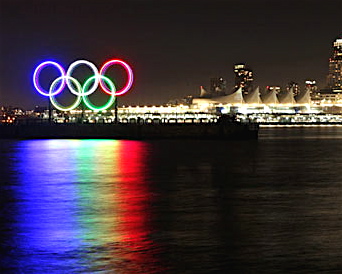 |
| For the¬†first time a lounge‚ÄĒset in a boutique hotel‚ÄĒfor gay athletes and spectators¬†was set up¬†as part of the Olympic Village in Vancouver. |
Having come to AVĺ„ņ÷≤Ņ to talk about the challenges facing LGBTQ (Lesbian, Gay, Bisexual, Transgendered and Queer) athletes, Catherine Meade opens her presentation with a little exercise that gets everybody laughing.¬†
Asking her audience to close their eyes, she lists a set of drawing instructions: ‚ÄúDraw your left leg.¬†OK, good.¬†Now draw your right ear,‚ÄĚ and so on, until most body parts have been scrawled on to paper by giggling participants.¬†‚ÄúNow open your eyes,‚ÄĚ she says, and the room erupts in laughter as the audience considers the disconnected lines and squiggles they‚Äôve set down on paper.¬†
Then¬†Ms. Meade¬†drives her point home.¬†She compares our experience to that of LGBTQ people in sport. ‚ÄúIt‚Äôs really hard to have a sense of yourself when you don‚Äôt see yourself reflected,‚ÄĚ she says, and the laughter stops.¬†
Ms. Meade and her colleague Curtis Cartmill want to make athletics more welcoming to sexual and gender diversity on the national, international and local levels.¬†This includes the AVĺ„ņ÷≤Ņ campus where the speakers came to talk during a recent Allies at AVĺ„ņ÷≤Ņ meeting.¬†The Allies provide support for students, staff, and faculty of the Rainbow community and focus on countering homophobia and heterosexism in our local academic community.
A lawyer with a bachelor's degree in physical education and a master's degree in sport administration and management, Ms. Meade knows of what she speaks. During her years in varsity sport at McMaster University, she kept her sexuality hidden from colleagues.¬†She spoke of spending hours every day for four years training with her fellow track athletes, sharing the challenges and triumphs of the sport but adding, ‚ÄúNever once did the words, ‚ÄėI‚Äôm gay‚Äô cross my lips.‚ÄĚ
She challenged the audience to consider why gay and lesbian athletes aren‚Äôt out, particularly in view of the social justice gains made in other areas such as same-sex marriage.¬†She spoke of widespread negative comments about LBGTQ people from professional sports figures‚ÄĒmessages she sees being re-iterated among coaches and teammates throughout athletics.¬†
Dal alumnus Curtis Cartmill sees this negativity as contributing to the growth of separate and parallel gay and lesbian sports leagues and events. The positive side of this separate movement, he says, is community strengthening and building. He has been instrumental in developing LGBTQ curling and softball leagues in Halifax and the numbers in both sports are growing rapidly. And unlike mainstream athletics, they’re inclusive. Mr. Cartmill says teams in the LGBTQ leagues bridge communities and generations with membership including people of all ages from the LBGTQ and straight communities. 
Both Ms. Meade and Mr. Cartmill see positive aspects of the Gay Games and Outgames, ongoing international sports competitions for LBGTQ people modelled on the Olympics. They also see promise in the presence of Pride House, the first-in-history LGBTQ showcase included as part of the cultural pavilion at the Vancouver Olympics. 
Cultural and societal prejudices don‚Äôt change overnight, but they see hope in the long term when perhaps there will no longer be separate and parallel leagues in sport.¬†Until that day comes, the speakers urged people to advocate for change in their everyday lives¬†by resisting heterosexist and homophobic language and attitudes wherever they‚Äôre encountered.¬†For local athletes, coaches and parents Ms. Meade and Mr. Cartmill see opportunities for change contained in addressing a slur on the ice or in avoiding assumptions about the sexual orientation of a teammate or a teammate‚Äôs parents: they see change beginning on the home turf.¬†‚ÄúGames can change the world,‚ÄĚ says Ms. Meade.¬†
LINK:
